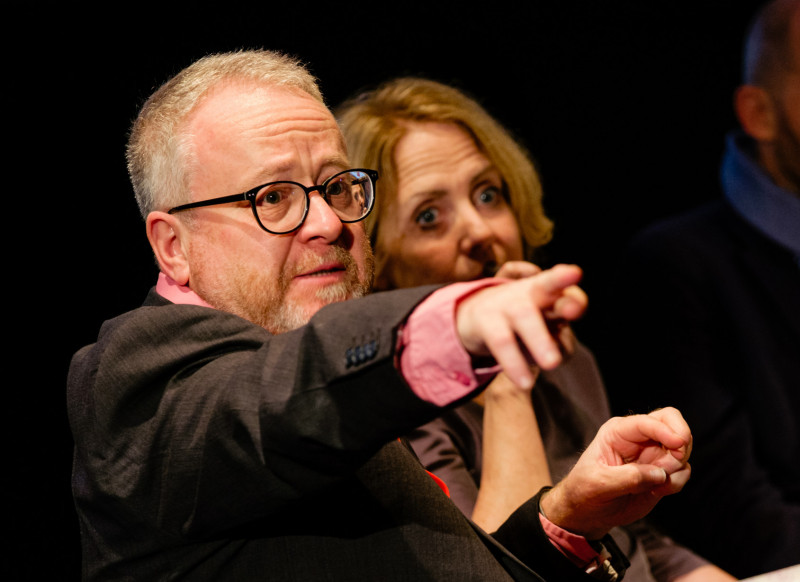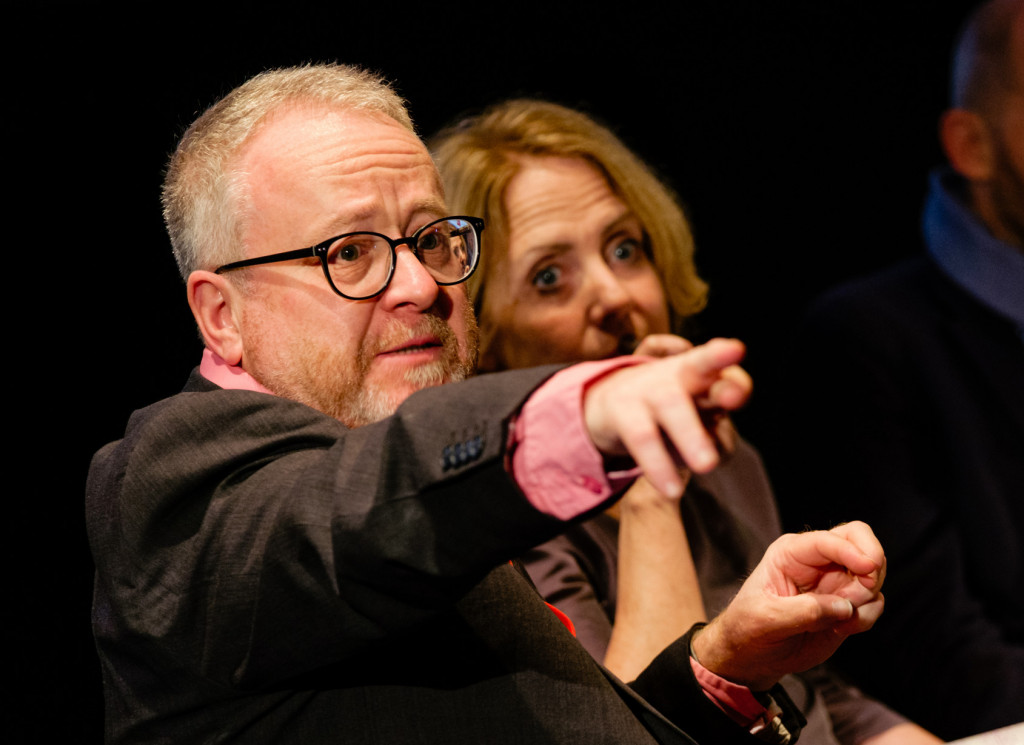My James Baldwin Great Reading Adventure (and What it Taught me About Truth and Honesty) Andrew Kelly

Share this
Growing up near Wolverhampton with a mixed-race foster brother taught me early lessons in racism. Out of 1200 pupils, there were just two black children at the school we attended. The National Front had a few vocal supporters in the classrooms. I can remember the village vicar condemning the owner of the local chip shop for giving racist leaflets to customers. It was the same shop my brother used to visit to play with the kids there. It wasn’t easy for him.
The racism I saw then haunts me to this day. The pain and the humiliation, encountered vicariously, and, to be honest, the guilt about not dealing with it, has stayed with me. If I had read James Baldwin then, I may have understood better and helped more.
I did read Baldwin at university, though I don’t recall him being on any reading list. I wish I had read more of his work then, too. The library was my home, as it was Baldwin’s for a time. But it took me three decades to come back to read him in full.
I was determined that Bristol Ideas – an organisation dedicated to running cultural programmes in the city – would mark the centenary of Baldwin’s birth in 2024. We had run what we called, rather grandly, The Great Reading Adventure for seven years from 2003. We gave away thousands, sometimes tens of thousands of the same book for each of those mass city reads. The books we chose were ones that could tell us something about the times we were going through, and that could encourage learning and debate: Treasure Island (1882) in 2003, about trade and slavery; The Day of the Triffids (1951) in 2004, about the environment (that was a stretch, I admit, but it was fun to do); Small Island (2004) in 2007, about the Windrush generation and the bicentenary of the abolition of the slave trade. The project ended in 2010, but we brought it back for a mass reading of The Autobiography of Malcom X (1965) in 2015.
I wanted to do the same for Baldwin, but I couldn’t raise enough money to give away 50,000 copies of his books (as we did with Andrea Levy’s Small Island). Instead, I looked for subjects in Baldwin’s work which we might address in different ways. As part of this, I embarked on a personal reading adventure aiming to read all Baldwin’s novels, essays and short stories, and as much writing about him as possible. This deep immersion over many months in 2023 set me thinking about what we might do to mark his centenary. The publication of these essays in this WritersMosaic guest edition is in part an answer.
I have always been interested in cities as places to be creative, and Baldwin was a city person, writing about Harlem, Paris, Istanbul and London. Cities were places where he could blend in, as his friend David Leeming wrote in his biography of Baldwin. I was interested in where Baldwin felt at home, most free, and could write best – Istanbul seemed to offer that. I wanted to send the Bristol writer Edson Burton on a tour of Baldwin’s cities. That hasn’t happened yet, but we do have Burton’s fine piece here on Baldwin and the strength to love. And Bristol Ideas will screen three short films on Baldwin and cities.
Another subject I wanted to reflect on was Baldwin’s education. Like him, I benefitted from kind teachers. Where would Baldwin have been without Orilla ‘Bill’ Miller, who introduced him to books, politics, films and theatre? Where would I be now without the guiding hands and encouragement of Miss D? I was able to thank her recently for all she had done for me, as Baldwin had thanked Bill.
I did wonder about personally reading the books I knew Baldwin had read, but there were too many. He said he read all the books in the branch of the New York Public Library he used. It did remind me that a rereading of Dicken’s A Tale of Two Cities (1859), a book which haunted Baldwin and one he read and read, is long overdue.
Was there something about the moral purpose of art for us to look at? Jack Parlett, author of Fire Island: A Queer History (2023), writes here that Baldwin’s work succeeded in this purpose perhaps more than any other writer in the twentieth century.
I got especially interested in Baldwin and cinema. He loved watching films, and writing about and discussing what he’d seen. I knew most of the films he writes about in The Devil Finds Work (1976), his book-length essay on cinemagoing, but I watched them again as I reread the book, wanting to see them through his eyes. I considered a mini festival of these films, but no cinema these days will show The Birth of a Nation (1915) or Gone with the Wind (1939).
Could I do something on Baldwin and Ingmar Bergman? As Baldwin wrote in ‘The Northern Protestant’, an essay that appears in Nobody Knows My Name (1961), Bergman was one of the very few genuine artists working in films with whom he identified in ‘what I felt he was trying to do. What he saw when he looked at the world did not seem very different from what I saw.’ I also wish I’d been a fly on the wall when Baldwin met Charlie Chaplin on the set of A Countess from Hong Kong (1967), where he’d gone to pass to Marlon Brando the film treatment of his play, Blues for Mr Charlie (1964). Chaplin knew Baldwin’s work well, and The Great Dictator (1940) – Chaplin’s great moral attack on Nazism – was one of Baldwin’s favourite films. Blues for Mr Charlie was one of the films that Baldwin tried and failed to make, and that was another project I would have liked to develop: Baldwin’s failed films, of which there were many, underwritten by his filmmaking obsession.
Reading Baldwin helped me to understand Bristol more. I was thinking about him in the aftermath of the great reckoning that Bristol faced following the toppling of the statue of the slave merchant Colston. Bristol’s City Poet, Vanessa Kisuule, wrote her poem ‘Hollow’ in the aftermath, and it deservedly went viral. I don’t remember Baldwin being mentioned around this time, and did wonder whether he was still being read. But clearly, he was never far from Kisuule’s mind, as she describes here.
Baldwin is one of my intellectual heroes, alongside George Orwell, the ‘silent spring’ environmentalist Rachel Carson and Jane Jacobs who warned of the harsh urban environment of American cities. I’ve often thought about why these writers and campaigners are important to me, and it comes down to the work that each did in pursuit of the truth. So too, Mendez writes here about the inspiration he takes from the wisdom and truth that Baldwin accumulated throughout his life. Inua Ellams quotes from Baldwin’s 1957 short story ‘Sonny’s Blues’, emphasising that ‘while the tale of how we suffer, and how we are delighted, and how we may triumph is never new, it always must be heard. There isn’t any other tale to tell, it’s the only light we’ve got in all this darkness.’ Baldwin’s art is in this sense about redemption, about presenting and telling the truth.
James Baldwin has taught me so much about race and other lives and America, but also taught me about me and where I live. In Nobody Knows My Name, Baldwin writes that he still believes that ‘the unexamined life is not worth living’ and ‘I know that self-delusion, in the service of no matter what small or lofty cause, is a price no writer can afford.’ Baldwin helps the reader examine their own lives, as the essays in this guest edition by Edson Burton and Chitra Ramaswamy show.
And he helps think about home, too. There are times when I dislike Great Britain, but there are more times when I love this country, and this ambivalence is why, as Baldwin says of the United States, ‘I insist on the right to criticize her perpetually’. It is the same with the city of Bristol. Reading Orwell and Baldwin has taught me about being a critical friend to places where I live and work, and gives me hope that we can make something better from the problems of the present, and out of the ruins of the future – a task which becomes more urgent, and harder, by the day.
So, reading Baldwin – which is a life’s work, as Jack Parlett writes – is part of that task. I do not regret for one moment the time I have spent with him. I have learned about race and sex; about love and hate; cities and creativity; how to watch films better; about being a witness; about reading more widely; identity and home; keeping faith; about hope and the future. There are six further essays here on the influence that Baldwin has had on writers. I hope that one result of reading them will be that more people seek out his work. And I hope that the rest of the work Bristol Ideas does this year and in 2024 to mark this remarkable writer – in theatre, art, film, literature and poetry – will achieve that, too.

Andrew Kelly is Director, Bristol Ideas. He is a visiting professor at the University of the West of England and has written or edited 20 books on subjects ranging from film and cinema to aviation and Bristol’s rich cultural history.

We are grateful to WritersMosaic for their grant to support our James Baldwin projects. Audio versions of this essay can be found at writersmosaic.org.uk.